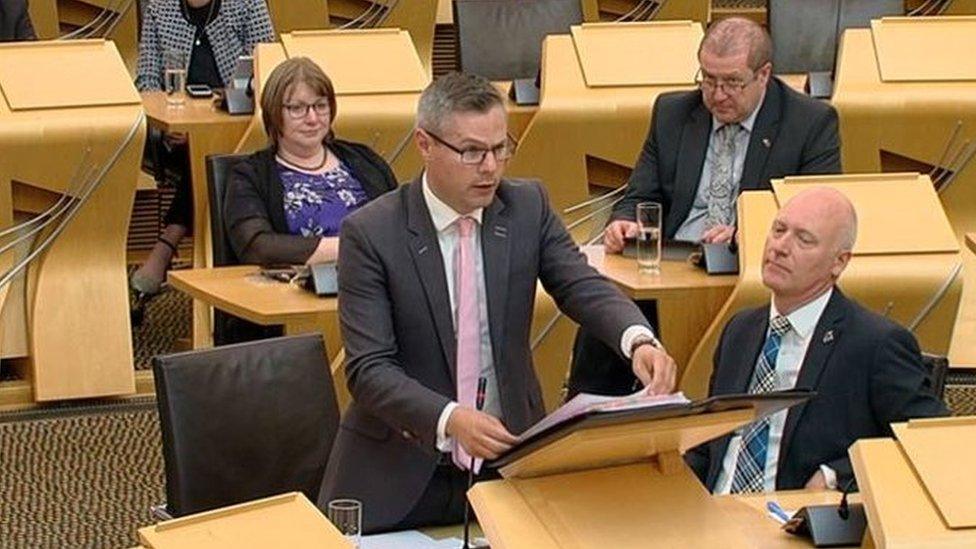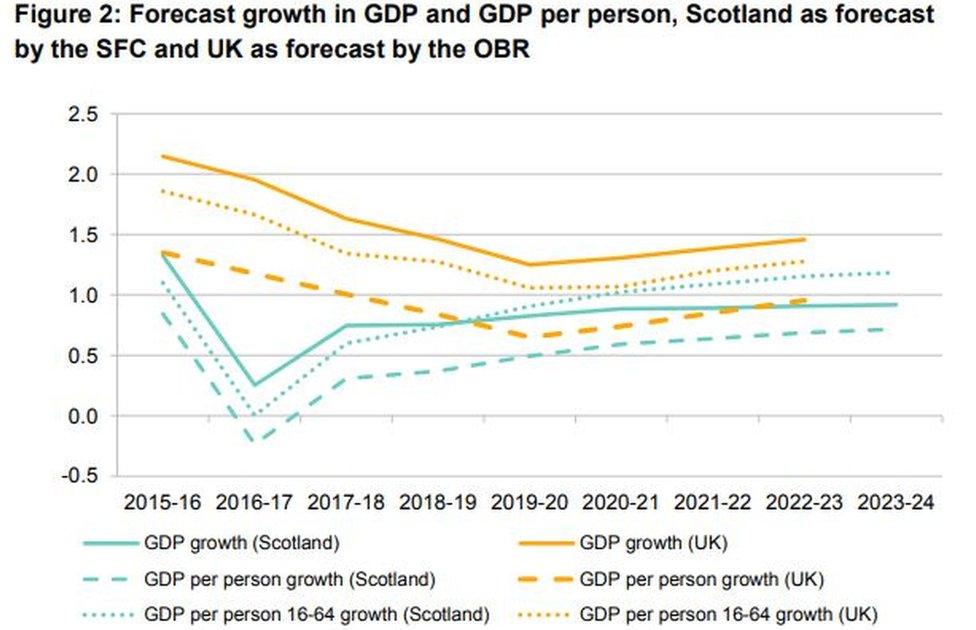Scottish economy faces 'subdued' growth for years to come
- Published

Derek Mackay said Westminster austerity was to blame for poor growth in Scotland
Scotland's economy is set for five more years of "subdued" growth, lagging behind the UK as a whole, the Scottish Fiscal Commission has warned.
The forecaster cut its estimates for the coming years, saying growth will fail to exceed 1% in the years to 2023.
It also predicted that wages will fall in real terms this year, and will not start to rise until 2020.
The Scottish government insisted the "challenging" outlook was a result of UK government austerity policies.
But opposition parties claimed the "grim" forecasts showed that the SNP should focus more on economic matters than the constitution.
The SFC - which is responsible for producing independent economic forecasts for Scotland - said the outlook for the Scottish economy "remains subdued".
It does not foresee, external GDP growth reaching 1% in the period running up to 2023, lagging behind Office for Budget Responsibility forecasts for the UK as a whole.
The commission also said real wages were lower today than they were a decade ago, and that the outlook was weaker than expected, with no real-terms growth until 2020.
This has an impact on the predicted tax take over the coming years, which has also been cut back.
The forecast income tax take for 2018-19 has been revised downward by £209m as a result of weaker than expected wage growth.

Economic growth in Scotland is forecast to lag behind that of the UK as a whole
Scottish Finance Secretary Derek Mackay set out the forecasts while presenting his first medium-term financial strategy to MSPs at Holyrood.
Mr Mackay said Scotland faced "significant challenges", but said the "ideological choice" of austerity by the UK government was a "fiscal straitjacket" which was to blame for weak growth.
He said: "This strategy clearly lays out the consequences of UK choices on Scotland's public finances, including UK imposed decisions on austerity, immigration policies that don't suit Scotland, and taking us out of the single market through Brexit.
"We will always deliver responsible government and balance the books, and I challenge the Chancellor to change course."

SFC said the economy would be held back by the country's shrinking number of working-age people
The SFC said that "when the effects of population growth are stripped out, Scottish growth is much closer to UK growth". They said a shrinking population of people aged between 16 and 64 would hold back the economy.
Mr Mackay said this proved the case for devolving greater control over immigration to Holyrood.
However opposition parties were quick to draw links to the SNP's recent "growth commission" report, saying the government should have greater focus on the economy than the constitution.
What do opposition parties say?
Scottish Conservative finance spokesman Murdo Fraser said the "contrast between the UK government's progress and the dismal performance of the Scottish economy relative to the rest of the UK after 11 years of this government could not be more stark".
He said: "Despite all his protestations, the finance secretary cannot blame this on Brexit - it hasn't even happened yet. These problems predate even the Brexit referendum vote.
"The SNP has obsessed with the constitution for years now, and we can see the impact of its neglect on areas like the economy in these figures."
Mr Mackay responded by saying the Conservatives had clearly not read the growth commission report, and said there were plenty of strengths in the Scottish economy.
Labour's James Kelly said "last week we had the SNP cuts commission, today we have Derek Mackay's cuts forecast".
He said: "The announcement today will give no comfort to patients waiting for hospital appointments, to parents where schools don't have enough teachers, to passengers stuck a railway stations waiting for trains that do not turn up.
"These SNP plans are timid, contrasted with Labour's bold plans to invest in public services an grow the economy".
Mr Mackay said the Scottish government's tax proposals provided more money for public services than Labour's "reckless, incompetent" proposals.
Scottish Green co-convener Patrick Harvie argued for councils to be given the power to make "meaningful economic choices" based on local circumstances, calling for local tax reform and "decentralisation of economic and fiscal power".
And Scottish Lib Dem leader Willie Rennie said the "grim" forecasts were "a clear failure of the Scottish government to boost the economy after ten years in government", adding: "From investing in people and skills to delivering the necessary infrastructure, this government has been found wanting."